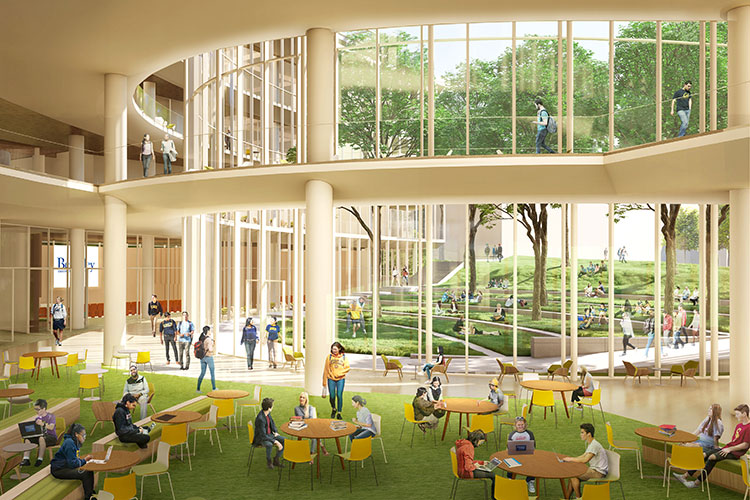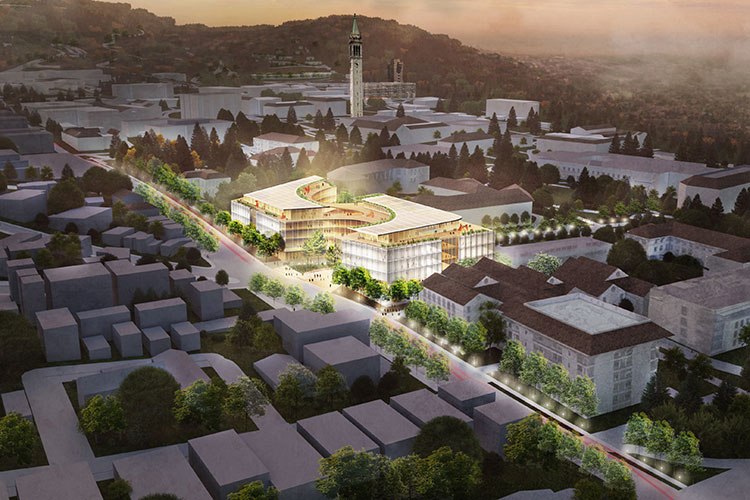Trio of gifts, $75 million, accelerates transformation of computing and data science at Berkeley

The University of California, Berkeley, today (Monday, June 7) announced three gifts of $25 million each that will reinforce Berkeley’s position as a leader in computing and data science research and education, and help create a visionary new home for the Division of Computing, Data Science, and Society (CDSS).
Notably, two of the gifts are from current Berkeley faculty: professors Scott Shenker and Ion Stoica of the Division of Computing, Data Science, and Society, and the College of Engineering.
“We are deeply grateful for these three gifts.” said Jennifer Chayes, associate provost of the Division of Computing, Data Science, and Society. “I cannot imagine a stronger endorsement of CDSS and of Berkeley than the unprecedented generosity of our two current faculty, Scott and Ion.”
Shenker’s portion provides $25 million for the Gateway, a planned nexus for collaborative, integrated data science and computing education and research to solve societal problems. Stoica’s gift of $25 million will support construction of the Gateway and two new full-time faculty positions in computer science. The third $25 million gift, from an anonymous donor, will also help facilitate development of the Gateway.
Anticipated to open in 2025, the Gateway will provide 380,000 square feet of space for research, teaching and co-creation for more than 1,600 faculty, students and staff of CDSS and other units. Equipped to connect the power of computing and data science to disciplines across the campus, the Gateway will attract researchers ready to confront complex challenges in areas such as climate and sustainability, human health and social justice.
“We want to build an idea factory, an ecosystem where students, faculty and staff can come together to tackle complex societal problems and pioneer new approaches in computing and data science,” said Stoica. “We don’t know what those future innovations will look like, but we want to create an environment that will attract the best people and where great ideas will flourish.”
Realizing this vision for the Gateway is a top priority of Light the Way: the Campaign for Berkeley, which has set a goal of raising $6 billion. In February 2020, an anonymous donor’s lead gift of $252 million, the largest single contribution in Berkeley’s history, provided a firm foundation for the Gateway. Including the three new gifts, the Gateway is now halfway funded. The balance needs to be raised before groundbreaking proceeds.
“These generous gifts are so inspiring and represent great momentum for the Gateway,” said Chancellor Carol T. Christ. “The gifts from faculty speak not only to the power of Berkeley’s vision of data science and computing but also to the unique impact of our faculty in driving innovation and change from the ground up. The Gateway will accelerate this culture of transformation and collaboration and direct it to improving human health, social justice and environmental sustainability.”

Berkeley launched CDSS less than three years ago as part of an ambitious plan to expand teaching and research in data science, recognizing the profound impact of data and computing in a rapidly evolving digital world. The division emerged in response to efforts by faculty, students and staff to build a new data science curriculum from the ground up. As an indication of the explosive growth in this field, student enrollment in the introductory Foundations of Data Science course started at fewer than 100 when it was first offered in 2015 and has increased to 3,000 students a year today. Nearly one in every five of Berkeley’s 30,0000 undergraduates now takes a data science course each year.
“It’s by far the best data science program in the world, and that was made possible by the faculty and students acting out of passion,” said Shenker. “We are a faculty-driven, mission-oriented university, and that allows people to do incredible things.”
The mission to educate the next generation of students on both the technical know-how and the ethical and societal dimensions of data science sparked a transformation in campus organization — connecting people, departments and research units across the College of Engineering, the College of Letters and Science and the School of Information. In January 2020, Jennifer Chayes came to Berkeley from Microsoft Research to lead CDSS as the associate provost of CDSS and dean of the School of Information. Chayes is working closely with Tsu-Jae King Liu, dean of the College of Engineering, and a diverse range of other campus leaders to support the transformative mission of the Gateway.
Shenker and Stoica have been inspired to step forward philanthropically and help Berkeley build upon what faculty and students started.
“At Berkeley, faculty are more likely to take risks and be pioneering,” Stoica said. “New fields of study are created and explored here.”
Berkeley has been the birthplace of a long line of technological innovations from RISC to BSD UNIX to Apache Spark. For instance, Apache Spark, a big-data processing system, enabled the founding in 2013 by Berkeley faculty and graduate students of Databricks, now an industry-leading, cloud-based data analytics and AI company.
Besides Stoica and Shenker, the co-founders of Databricks include Ali Ghodsi, Matei Zaharia, Patrick Wendell, Reynold Xin, Andy Konwinski and Arsalan Tavakoli-Shiraji.
Shenker noted that further advances will come from transcending disciplinary boundaries and integrating human implications and considerations of societal impact into the core of computing and data science.
“This interdisciplinary approach and collaborative spirit is woven into the foundations of CDSS at Berkeley,” Shenker said.
